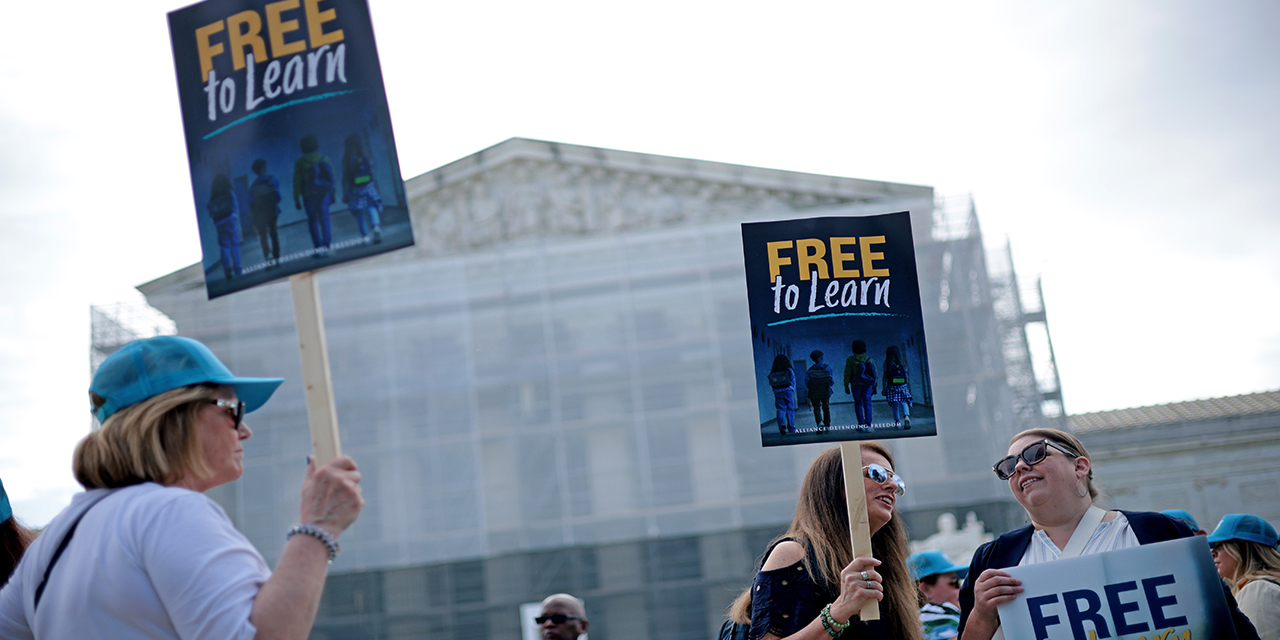
Charles Fain Lehman, Ilya Shapiro, Daniel Di Martino, and Renu Mukherjee discuss the Supreme Court’s consideration of a religious charter school in Oklahoma, Canada’s election, and staying entertained on public transit.
Audio Transcript
Charles Fain Lehman: Welcome back to the City Journal Podcast. I’m your host Charles Fain Lehman, a fellow at the Manhattan Institute and senior editor of City Journal. Joining me this week on my panel are Ilya Shapiro, All Things Legal at the Manhattan Institute, Daniel Di Martino, All Things Immigration at the Manhattan Institute, and Renu Mukherjee, Some, Indeed Many Things Educational at the Manhattan Institute. Thanks everybody for hopping on.
Ilya Shapiro: And we have to congratulate Renu. She’s a newlywed now. I don’t know why she’s not off on some beach, you know, sipping margaritas or piña coladas, but here she is with us.
Charles Fain Lehman: We do, we do. Congratulations. Instead she decided to do the City Journal Podcast, which is a honeymoon in and of itself. Exactly.
Daniel Di Martino: That is how good this podcast is.
Ilya Shapiro: That’s right.
Renu Mukherjee: It is. There is nothing more blissful than the City Journal Podcast.
Charles Fain Lehman: Precisely, precisely. That’s what everyone’s going for. All right. I want to take us into the news of the day and actually the news of yesterday when the Supreme Court heard oral arguments in the St. Isidore case, which is asking whether or not the state of Oklahoma violated the First Amendment by denying a religious school access to its charter school system. Early reporting suggests that this is going to be a win for the school and for religious liberty more generally, but you can never really read the tea leaves in these things. So Ilya, want to go to you first as our guy for all things legal, tell us a little bit more about the case. I know you filed an amicus brief in the case. So tell us how, A, what’s going on, and B, how you thought about it and your team thought about it.
Ilya Shapiro: I’ll get to our brief and how that fits in, but most states in the country, I think we’re up to 46, have provisions for charter schools, which are publicly funded but independently run. And there’s a whole panoply of charter schools, some that focus on having uniforms and more discipline, some classical education, some LGBTQ-friendly. Some, like in Oklahoma, are run by Native Americans and, you know, more of those traditions. So for the first time anywhere in the country, a religious school accepted terms, accepted the regulations, the oversight, the curriculum oversight and what have you, from the Catholic diocese in Oklahoma, and the board, the charter school board, approved their application to run a charter school.
The attorney general blocked it, however, and said that it would constitute an establishment of religion, that Oklahoma would be publicly funding religious education. So the question is, is this indeed an establishment clause violation? Is it the public funding of religious education? Or if this school is denied, and this is where we filed, where the Manhattan Institute filed our brief, would it be disqualifying an entity simply because of its religious status? And there is some tension there because charter schools are a relatively new thing. I don’t mean in the last few years, but it used to be that there were private schools and there were public government schools and that’s it. And there’s this charter school. What is it? And this is what the justices were debating. Is it a state actor? Is it a government entity? Is it direct public funding of religion? Or is it like another series of cases that have said in the last decade where the Supreme Court has said, if you have a generally applicable neutral public program, you can’t disqualify an entity from its benefits simply because of its religious status.
Daniel Di Martino: That’s the question I have on this case, Ilya. What’s the difference between establishing a charter school and getting government money and receiving a school voucher for your kid to send him to a Catholic school?
Ilya Shapiro: There’s levels of parental choice. So here it’s not that each parent gets a certain amount of money as provided by a statutory formula or from a scholarship organization that’s a further step removed from any public funding that gets a tax write-off or something. Here it’s funding per pupil, the same formula that any traditional public government school gets. And anyone is welcome to attend this school, but it’s not that the parent has a voucher or a tax scholarship or something like that and takes it to the school.
Renu Mukherjee: And Ilya, isn’t that distinction precisely why some of the justices, including Chief Justice Roberts, was a bit skeptical in comparing, at least in oral argument yesterday, the case of St. Isidore to the Trinity Lutheran trilogy, saying that it seems as though there is a higher degree of involvement? What do you make of that?
Ilya Shapiro: That’s exactly right.
Charles Fain Lehman: And what’s Trinity Lutheran for those not in the know?
Daniel Di Martino: Yeah, I don’t know.
Ilya Shapiro: Right, right.
So Trinity Lutheran is one of the leading cases on point. I sort of alluded to this in the recent, there’s a recent Trinity as it were of cases, three cases. Trinity Lutheran was about playground resurfacing and all of these in Missouri and all of these organizations, entities, locations qualified for state playground resurfacing grants except for the playground that was attached to a church, which otherwise qualified but simply because it was religious was disqualified and the Supreme Court said no that’s inappropriate. We’re not buying Bibles for the church, we’re doing playground resurfacing. You can’t discriminate against it based on its status.
Another case, Carson versus Macon, where in Maine if there’s a big rural state, if there’s no high school in your district, you can take the same amount of money the state would otherwise spend on your kids’ education and take it to any high school. Private, public, somewhere else in the state, what have you, know, Andover and Deerfield and what have you. But what about a religious school? And here again, the Supreme Court said, look, you’re saying they can take this anywhere except religious schools. That’s inappropriate. So here it’s a closer case because again, as has now gotten out in our discussion here, it’s a direct public funding of a religious institution, but one that is independently run. It’s not that the state is kind of a hybrid or somewhere in the middle.
So where do you draw that line? And your right to pick up on Chief Justice Roberts. is the key here. Amy Coney Barrett is recused because she had been involved with the Notre Dame Law School clinic that is that brought the case that that organized that has been advising the Saint Isidore. So there’s there’s eight justices. The three Democratic appointed ones are clearly against the school. The other four seem to be leaning quite strongly to allow this. And Chief Justice Roberts is the deciding vote. If it ends up four to four, there will be no opinion from the Supreme Court and the Oklahoma Supreme Court’s opinion affirming the denial of the charter status to the religious school will remain.
Daniel Di Martino: Okay, now several questions on this. Well, two, why is the Oklahoma Attorney General even doing this? Like, is this a Republican center? What is going on here? Like, do they hate Catholics now? Are there other religions establishing public charter schools? And then the other thing, it seems to me that the key difference here is that this is a charter school, meaning the kids could go to a traditional public school if they want it. So this is just additional choice and it’s open to any and should be open at least how I perceive it to any religions because if you can establish I’m sorry a gay public charter school, I’m sorry, you need to be able to establish a Catholic public charter school.
Ilya Shapiro: The Oklahoma politics are interesting and I know a little bit about this because for the last 12 years or so I’ve been going every summer to speak to do a Supreme Court roundup for the Federalist Society chapters in Oklahoma City and Tulsa. In fact, I just yesterday booked my plane tickets for the next trip. It’s going to be the second week of July. And yes, it’s a Republican attorney general, but sort of a self-funding squish. So there was a previous attorney general. Scott Pruitt was the long-time attorney general. He joined the first Trump administration. There’s a scramble, some dominoes, some internal politics, then there was a primary. I mean, anyway, all of this weird local, you know, in state politics in a in a relatively small state in terms of population, and so this guy comes who’s a Republican, because you have to be a Republican to be successful statewide in Oklahoma, but he doesn’t you know he’s not aligned with the conservative legal movement, let’s say.
Charles Fain Lehman: I want to take Ilya off the hot seat and ask a little bit about the sort of broader charter school implications here, because you know my intuition and I think this is true of a lot of us is it’s good to expand choice, it’s good to expand religious liberty, but there’s been there’s an interesting argument from a friend of City Journal, George Will, in the Washington Post a little before the case in which he pointed out that you know there’s a real risk of this sort of stalling the charter school movement because it sort of introduces pre-existing cultural tensions around the role of religion in the public sphere. That in some senses, for those of us who want to see charter schools keep expanding, you risk the sort of bringing that cultural baggage into what is otherwise a broadly popular movement. So, Renu, Daniel, I’m curious what you make of that view. Do you think he has the better of the argument or, you know, is it, should we be leaning into the “all options for charter schools”?
Renu Mukherjee: That you know, the case with St. Isidore presents the future of charter schools, but the argument that you just brought up, Charles, is interesting because our colleague Nicole Stelle Garnett, who’s written extensively on this this issue and this case specifically has been involved. She had a piece in City Journal perhaps maybe a year or even longer ago at this point where she had a sentence in which she threw the idea that if the court allows St. Isidore to go forward and you open the door, you crack the window to religious charter schools, then you know this would mean that you’d allow charter schools for other faiths as well, such as for example Islam. And that had caused you know some consternation among perhaps you know conservatives and whatnot with respect to charter schools. It was just one sentence, but sort of the response to that idea going out there was interesting. So I think to your point referencing this Washington Post piece, like yes, this is the future. But at the same time, it opens the door to you’re not just going to have then Catholic charter schools or of other denominations of Christianity, you’re going to allow for perhaps Hindu charter schools, Islamic charter schools, know, and that definitely might bring some of the culture war tension into this issue.
Daniel Di Martino: So I think the issue here is they don’t have school vouchers. This is why there’s even an attempt to open a public charter school that is Catholic, because in other places they would prefer to be private, because that gives them even more control. So I think the solution politically to this is that we need to enact full school choice in every state so that you can take your school dollars with even more independence from the government to your Hindu school.
I have no problem with schools of other religions. I think it’s great. In fact, I view that, you know, as a Catholic, I view a threat to Catholicism more the atheistic, secularist state than other faiths. So in my opinion, it’s always a positive if the children of religious families in the U.S. can, you know, maintain religious values. And I also think Catholic education tends to be superior. And even people of other faiths go to Catholic schools because of how good it is.
Renu Mukherjee: I mean, I’m a Hindu and I’m fully Catholic educated.
Daniel Di Martino: And I know you went to Catholic school.
Charles Fain Lehman: It’s very American. I want to, you know, the other angle on this that’s very interesting to me is that as we alluded to earlier, sort of this line of cases where the court has tried as much as possible to create carve outs for religious liberty. And in some sense, this is created like comedy on the court where they’re just like, we want to, we want to preserve people’s right to be left alone in their religious faith. And that sort of joins the right flank of the court with it’s sort of more religious liberty concerns to the left flank of the court with its more civil libertarian concerns. But I think we’re now sort of getting into these thornier questions. So there’s this case, there’s the local opt-out case in Montgomery County that got heard earlier. It’s now last month, so you know, I wonder if that…
Ilya Shapiro: We filed there as well. That’s an interesting case where the various religious parents said that we had been getting an opt-out and then the school said, too many students were opting out of these gender-identity related books and so we had to kill the opt-out.
Daniel Di Martino: Maybe because nobody wants it.
Charles Fain Lehman: Yeah, so let me just ask and then we can move on. Are people worried about the broader religious freedom project? Are we going in the right direction? Is there a risk of this becoming more controversial? Are they going to be able to stay the course?
Ilya Shapiro: Well, look, this raises a certain point there is a tension between religious free exercise and the Establishment Clause. Because if you’re going to have one size fits all government schools, there have to be decisions made on curriculum, on values, what is the lowest common denominator or just common denominator.
So as Daniel said, the optimal solution is not to step on anybody’s toes and let them choose what kind of education they have. And sure, you can still have state supervision to make sure they’re not abusing kids, to make sure kids are actually learning math rather than interpretive dance 24-7, know, things like that. But beyond those basic kind of standards, it would be, you I think we’re much past… just like educators, innovators are rethinking the model from the 19th century, little-red-schoolhouse, farm kids style of education where everyone sits in the same place for certain blocks and things like that, we need to rethink the funding structures and the governance mechanisms.
Charles Fain Lehman: Renu, where do you fit in on this? I mean, I suspect you’re sympathetic to the school choice argument. I’m curious about where you see it going from here.
Renu Mukherjee: Very sympathetic, as you know, and Charles, I echo everything Ilya said. I also want to point out something really great. I refer to it as, excuse me, an intelligent academic role at the end of Ilya’s, on behalf of MI’s, amicus brief, in which he brings up a number of other institutions that provide services to the public that are not necessarily considered, you know, these organizations aren’t considered, you know, arms of the state. But these are religious organizations such as running shelters, for example. You know, a lot of religious organizations are the backbone of that. And, you know, he makes that argument. So I think, you know, this is a case in which you have this institution that has this religious background, but that doesn’t automatically mean it’s an arm of the state simply because it’s providing education, which is a very broad thing that the state does. It’s perhaps a bit too broad.
Ilya Shapiro: At base, why to me it doesn’t seem like an establishment of religion is because nobody is being forced to go to this school. And it came up during argument. What if the religious school was the only one in the district, which is kind of far-fetched because there typically would be a traditional public government school unless we go to a full school choice system, in which case it would be a different world altogether. But the lawyer for St. Isidore said, well, that would present different sorts of issues and far afield from what we’re doing now.
Daniel Di Martino: Exactly. Of course.
Charles Fain Lehman: All right, all right, I’m going to take this out. So before we do that, one sentence answer. Who do you think is going to prevail in the case? We’ll leave Ilya’s as the surprise for the end. So Dan, we’ll start with you. Is it St. Isidore or Oklahoma?
Daniel Di Martino: I’m going to be a pessimist that it’s going to be a 4-4 and I hate it because I want the school to win.
Charles Fain Lehman: Okay, Renu?
Renu Mukherjee: Also a pessimist, I’m going to say Oklahoma because of some comments made by the Chief Justice yesterday.
Charles Fain Lehman: Ilya, Ilya save us.
Daniel Di Martino: So you think it’s going to be 5-3 in favor of the school, or 4-4? You’re going to 5-3, okay. Okay, even more than me.
Renu Mukherjee: Yes, sorry, 5-3. Yes, 5-3. But I’m a pessimist just like you here.
Ilya Shapiro: Well, I think John Roberts is going to say going to school is a tax and therefore you can’t…
Daniel Di Martino: For context for the people who don’t understand it, read the Obamacare decisions and all that.
Ilya Shapiro: Well, that’s a deep cut or a not so deep cut depending on how closely you follow the court. Yeah, going back to the Obamacare litigation. But look, if it ends up 4-4, which I would say is maybe 55 percent confidence in a 4-4, and I’ll blame our colleague Nicole Garnett for being too good friends with Amy Coney Barrett and therefore forcing her recusal.
Charles Fain Lehman: I’m going to say it’s going to be 8-0 because everyone persuaded by the Manhattan Institute’s amicus brief to vote our way.
Ilya Shapiro: Hahaha
Charles Fain Lehman: Alright, let’s move on to talking about our sometime friend, sometime foe to the north, Canada. Earlier this week, Canadians delivered a stunning rebuke to both the Canadian Conservative Party and also, more importantly to us Americans, Donald Trump, when they returned the Liberal Party to another term in power under the leadership of Prime Minister Mark Carney. That’s a shocking about-face. Previously, we expected the Conservatives to rout the opposition because of the unpopularity of prior Trudeau government. But I’m curious about sort of how we think about this, both in the American context, politics context, and in the broader shape of the international right. Daniel, you said you were disappointed in the outcome. We were emailing about this. What are your thoughts?
Daniel Di Martino: Why don’t we ask Ilya first since he’s the Canadian here.
Charles Fain Lehman: That’s true. I don’t want to make him the token Canadian. He’s American to us.
Ilya Shapiro: Well, I go both ways on the 49th parallel, you know. I actually voted in this election. My only remaining tie to Canada is I still have the passport and I cheer for the Toronto Maple Leafs, but that’s about it. But the way these things work, know, for purposes of Canadian elections, I’m a permanent expat.
Daniel Di Martino: Good.
Ilya Shapiro: And I will forever be voting in the district where my dad lived, which is where I lived when I was in high school, which is in North York, which is in Toronto, north of downtown, but it’s a swing district. This was one of the latest ones that was called. I think it was ultimately won by the liberal by 1 percent, but it’s a swing district, or “riding” as they call them in Canada. And it was evocative of what happened on a broader scale. The Conservative Party actually got its highest share of the popular vote since 1988. The problem is this was happening at the same time as the socialist party, the New Democratic Party, was collapsing. And so all of the non-conservative voters, most of the non-conservative vote consolidated in the liberals and so they were able to score their fourth consecutive election win, albeit in the minority. They did not get a majority of the seats in parliament.
Even though this was a change election, the liberals managed to win their fourth straight in large part for two reasons. First, the heavily unpopular Justin Trudeau resigned and was replaced by a very different person. You know, Trudeau is kind of woke post-nationalism, all this weird stuff. Mark Carney is a central banker technocrat who’s never been a politician before, this kind of bland white guy who was able to benefit from the “rally around the flag” effect of Donald Trump attacking Canada saying annexation, calling Trudeau “Governor,” all of these things, which while popular with me, at least when I was younger, growing up and I wanted to be an American. I regretted the war of 1812. I wanted Canada to be part of the U.S. Now, definitely not. Let them manage their own decline. Maybe we can negotiate some sort of big, beautiful deal where we get Alberta and give them New England. But at this point, Canada is not doing well.
Daniel Di Martino: Yeah, I was very disappointed because I really liked Pierre Poilievre. I think he’s like a once in a generation leader that is charismatic and intelligent on policy ideas, like truly conservative.
Charles Fain Lehman: And he’s the leader of the Conservative Party.
Daniel Di Martino: Yeah, Pierre Poilievre was the Conservative candidate to be prime minister. He even lost his own seat. Though, I mean, to be fair, the Conservatives did increase as Celia was saying, they gained many seats net.
Ilya Shapiro: They gained more seats than the liberals did.
Daniel Di Martino: That’s right. The problem was, as he said, the consolidation around Liberals, right? know, Canada is not a conservative country. It’s very hard for the Conservatives to get 50 percent of the vote and achieve a broad majority in parliament unless the left is divided. And the left was not divided in this election.
And I also think that in a way, it was Canadians trying to just slap Donald Trump in the face, right? By electing somebody who is the total opposite of him. Like a technocrat central banker that is not charismatic and has never been in politics and all of that versus the young, charismatic guy who, Carney and the liberals really worked hard to say that he’s like Donald Trump even though he’s not. That’s right. Yeah.
Ilya Shapiro: Who was leading by 25 points as recently as December.
The socialist leader, the New Democrat leader, Jagmeet Singh, tore up an agreement that he had with the Liberals, that his party was supporting Trudeau’s liberals for the whole entire term until September. At that point, they were no longer obligated. They could have brought down the government. But Singh said, even though his party at that point was poised to become the second largest party in parliament, and he would have been the opposition leader, he could not stomach Poilievre and the Conservatives having a majority government. And so instead, he went along with the decline of his own party, which no longer has, quote, “official party status,” meaning they don’t get office space and funding and the right to ask questions. He lost his own seat as well. Lots of weird things going on.
Charles Fain Lehman: I want to ask Renu’s thoughts here is, you’re the political scientist. I’m curious, A, you know, what you make of that shift that we that it seems like Canadians are moving to a two-party system. And then B, just sort of like as Americans, how much should we care about Canadian politics? And there’s like a concrete in the news question, but it’s also just like, you know, to my mind, Canada is sort of interesting as like a control America. It’s like what if we had remained kind of European as opposed to breaking off in 1776? But I’m curious if you buy that and like, you know, much should I be invested, how much should I as an American be invested in what’s going on up there for like structural reasons?
Renu Mukherjee: Sure, I mean, I think how Ilya and Daniel are describing kind of the shift from Singh and the votes going kind of to the Liberal Party, the whole time I’m thinking about, you know, what ended up happening with Trump and RFK. You know, if you had Trump sort of make this deal, of course, know, RFK and whatnot, it’s not the degree of significance of, you know, sort of, this party to the exact equivalent of what’s happening in Canada. But there was that real fear. Are the votes from RFK going to go to Trump? Are they going to go to VP Harris. And so I think that’s an interesting comparison to make and sort of, you know, shows the shift of the two-party system in Canada kind of mimicking what we saw a few months prior in the U.S. In general, though, to your point about like how much should we Americans care about our northern neighbor, I think a great deal.
And, you know, maybe people won’t like me saying that just as I think, you know, maybe this is sort of the like squish diplomatic answer coming from me. You know, we should care about just party systems throughout the globe just in general, it’s quite interesting. And you kind of even see this happening in the U.K. and other areas, just one dominant party rising to power, other parties sort of coalescing around it. And so I think due to increased polarization globally, and a lot of the coverage about these past elections in Canada, from just people on the ground, you have the Times, The Economist, whatever, on the ground kind of interviewing voters. Everybody sort of stressing polarization in Canada in a way in which we’ve heard in the U.S. for the last two decades, I would say. And so for those reasons, I think, you know, this election in Canada is interesting. There are echoes of what we just saw in the U.S. And I think, you know, we should care simply because, not just with respect to issues of trade and whatnot, then maybe Daniel, I’m curious what your thoughts are on how that affected these elections, but simply because a lot of the polarization is a story that we’ve heard in the U.S. for some time now.
Daniel Di Martino: I think also, you know, think about this, the trade part. This is another example in world history where massive tariffs create political change in foreign countries. I mean, think about it, the 1930s Smoot–Hawley tariffs perhaps led to part of the rise in fascism in Europe, right? Now, nothing is as dramatic here, right? But it is one example of how our economic policies can have unexpected political consequences abroad. That will affect us because think about it, Carney does not want to negotiate with the United States, does not want to cave into anything. Pierre Poilievre would have been much better for trade terms, would have been much better for energy because he wanted to deregulate energy, export more gas, more oil, which would have cheapened gas in the United States for all of us. So this is going to have literally a price for all of us.
And it’s also interesting if you see the election stats, Canada had kind of a similar phenomenon as the US in that there was racial depolarization, meaning immigrants, ethnic minorities in Canada shifted to the Conservative Party while white college graduates shifted to the Liberal Party. And in fact, that’s part of why Pierre Poilievre ever lost. It was because of the white college grad vote. While he picked up all the minorities, all the immigrants, he increased his vote share. It was just really unfortunate because of the American dynamics that he lost.
Ilya Shapiro: Although there were some differences in the sense that the Baby Boomers really went heavily Liberal as opposed to the younger folks. There are some superficial similarities to the U.S. But even among college educated, I think the younger folks generally went to Poilievre because there’s this issue of housing affordability, jobs. I mean, their economic situation is much, much worse than even what Gen Z Americans complain about. But, you know, I have this kind contradictory response to your question, Charles.
Daniel Di Martino: Good point.
Ilya Shapiro: Because I find Canadian politics endlessly fascinating, as do some other people, you know, our fearless leader, Reihan, Matt Yglesias, mean, random commentators, pundits, know, public intellectuals in America, you never know who, ideologically, because there’s lots of stuff to drill down on, I mean, the highest two-vote share, two-party share of the vote since 1958, together they got 85 percent.
I mean, writing by the previous two elections, the Conservatives actually got a higher share of the vote than the Liberals, even though Trudeau got minority governments. You can really, you know, nerd out on the political science. But getting back to the question of how much we as Americans should care, it kind of brings me back to that meme with Mad Men and Jon Hamm in the elevator where the other guy’s like saying, you know, “I hate you,” whatever. And he’s like, Jon Hamm’s like, “I don’t think about you.” You know, it matters somewhat on trade, but
Daniel Di Martino: I didn’t even think of that.
Charles Fain Lehman: Yes.
Ilya Shapiro: I think it’s unfortunate, it’s what have you, but at the end of the day, there more people in California, and Texas is about to approach a candidate’s population as well.
Daniel Di Martino: Ilya, come on, this is the largest unprotected border in the world. It’s the longest continuous land border in the planet between two countries. It’s Canada-U.S. border. There is no wall. There is no military. It’s a great thing. No, it’s a good thing. It’s a good thing. We need to keep it that way.
Ilya Shapiro: Not when Tom Homan’s going to be done with it.
Charles Fain Lehman: Not yet!
Renu Mukherjee: Okay.
Charles Fain Lehman: I’ve been calling for building the wall for a long time. They’re sending crime, they’re sending drugs, and some I assume are good people. No, mean, so part of the angle here, but I want to take this out, but part of the angle here, to Daniel’s point is that I sort of look at Poilievre and I go, like, he’s tough on crime, he’s tough on drugs, he wants to lots of housing, he wants to deregulate, he wants abundance. He’s sort of like what I think of as a social conservatism of normalcy, which is like, I am for normal people and I’m against people who hate normal people. So like in many ways, he’s like, he’s an MI conservative. And so I was cheering for him on that front, right? And he’s picking up the MI constituency, like, you know, right wing recent immigrants, that’s an MI constituency. So.
Daniel Di Martino: Yes! Yes!
Ilya Shapiro: Of course, you know, he’s known to a lot of Americans to the extent that he’s known by that one viral video of him eating an apple while a clueless reporter asks him things, then he just completely shuts him down. So there was, I saw on X last night, some Canadian commentator was said that Mark Carney needs to now unite the nation by giving his first speech in parliament while eating an apple.
Charles Fain Lehman: All I’m saying is, Pierre Poilievre, if you’re listening, we’d love to talk to you about a senior fellowship. No, I can’t make that offer. I’d love to interview him. Yeah, totally. Come on, blocks.
Daniel Di Martino: Or interview you or host an event!
Ilya Shapiro: He’s not leaving actually, even though he lost his seat. This is fascinating stuff. Only MPs, members of parliament, can live in the residence that’s given to the official leader of the opposition. So he temporarily has to move out of his house and then win a special election, which is called a by-election. This is what they do. He hasn’t resigned leadership of the Conservatives. He’s not going to be pushed out. He’s still very popular. So they’re going to drop him into some other safe seats somewhere to run for a by-election like in a month or so. And then he gets to move back into his house.
Daniel Di Martino: That’s great. That is so nice of them.
Renu Mukherjee: Amazing.
Charles Fain Lehman: Crazy. All right, all right. So I want to, Ilya alluded to this, you know, obviously the President would like to make Canada the 51st state for some reason. It’s really not clear why or if he actually believes this. Most Canadians are quite resistant. Some are.
Ilya Shapiro: Well, Team USA in hockey would be unbeatable.
Charles Fain Lehman: We already are. Most Canadians are not that interested, but there are a couple of provinces who might be a little open to it. Alberta, Manitoba, Saskatchewan. So here’s my question. Let’s say we did a trade. Which U.S. state would you trade for which Canadian province? Daniel, let’s hear what you take.
Daniel Di Martino: or the oil.
Okay, so for geographic beauty, you know, we need to have bordering states, I guess. So obviously give them Vermont. That’s the first one, bordering Canada, to give them. Bernie Sanders is out. Can you imagine? I mean, we could just give Vermont and not get anything back. And then…
Ilya Shapiro: But what about our strategic maple syrup reserve?
Daniel Di Martino: We’ll have plenty of maple syrup from Alberta and from Saskatchewan and Manitoba. Those are good. And then maybe we can give them, you know, Minnesota, Washington state. And the map would still look good. America will be much larger. It would have so much more oil that could be exploited. And then all the pipelines, there will be no problem with the Keystone XL pipeline because it’s not an international border anymore. The pipelines would get built.
Charles Fain Lehman: All right, Renu, where are you at on making the great swap?
Renu Mukherjee: I don’t know if I can think of a state to eliminate, but I would, and I don’t, this is definitely not an area of Canada that would, in my mind, be open to becoming a part of the U.S., but I love Quebec. I love everything about Quebec. was in Mont-
Charles Fain Lehman: You’re the only one.
Daniel Di Martino: That’s the worst part, Renu! That’s the most left-wing!
Renu Mukherjee: Okay, I know, but let me explain why. know, but it’s just so beautiful. Montreal, mean, come on. I was in Montreal recently, and I just thought- A lot of crazy things were happening, but it’s…
Daniel Di Martino: True.
Ilya Shapiro: You want in addition to “empuja dos para espanol,” you want “apui le trois pour le français.”
Renu Mukherjee: Some, you know I’m not a monarchist ,but you know add some you know European, like, you know pizzazz.
Daniel Di Martino: European America there.
Charles Fain Lehman: It is a very pretty place and the unfortunate problem is that it’s filled with Quebecois. So they have that. They have that working against them.
Ilya Shapiro: Nice place to visit. I recommend the old city of Quebec. Very romantic. Nice to have a cocktail on a porch in the summer. Good.
Daniel Di Martino: You know, I’m actually going in September, Ilya. I’m actually going. I’m taking a YAF cruise from New York City all the way up to Montreal and we’re stopping in Quebec City.
Renu Mukherjee: You’ll love it.
Ilya Shapiro: Yeah, but no need to own that.
Renu Mukherjee: That’s true.
Charles Fain Lehman: All right, Ilya, what’s your trade? All right.
Ilya Shapiro: Well, I already gave it. Alberta is the key. I mean, Saskatchewan, Manitoba would be fine. It would be great. I’ll take it. But Alberta is the key. That’s where a much greater population center, in addition to the oil. Saskatchewan brings wheat if we need that. But anyway, yeah, just New England. Just, you know, I’m sorry, New Hampshire. I’m sorry, you know, other people, whatever. But just to make it contiguous.
Daniel Di Martino: New Hampshire, Ilya, you’re giving up New Hampshire. Live free or die state.
Ilya Shapiro: Sacrifices have to be made. I think just have that whole contiguous block. I mean, I’d keep Maine, but then you’d need a land bridge to New York, and that would be tough.
Charles Fain Lehman: All right, I will be giving up most of the Pacific Northwest, they can have Washington, they can have Oregon, we will be taking the Prairie provinces. They can have like…
Ilya Shapiro: So reversing James Knox Polk’s fifty-four forty or fight!
Charles Fain Lehman: Yeah, yes, precisely. but you know, look, Washington State and Oregon are basically extensions of British Columbia already, they’re all just completely like, you know, drugs are legal in all three jurisdictions. So it’s just, it’s a crazy place to begin with, they’ve got to go. That’s how I’m thinking about it. All right.
Daniel Di Martino: Of course that’s the issue you brought up.
Charles Fain Lehman: Before we go, want to ask us, I want to ask everybody to send off. Our friends at the New York Post have a funny report out yesterday that Zoomers are now, and this is the phrase that they use, “barebacking” on their way to work, which that, we’re not going to comment on that.
Ilya Shapiro: Charles, this is a family program.
Charles Fain Lehman: No, it means staring at other riders on public transit, sitting there staring off into space rather than looking at their phones or looking at books as guess a form of protest as a way to… This may be entirely fake.
Ilya Shapiro: I’ve actually heard of this trend on flights, which is even worse. How… okay.
CFL
That’s “raw dogging,” which is different. All I know, all I know, the New York Post told me it’s real.
Ilya Shapiro: Kids these days, I’m-
Daniel Di Martino: Wait, wait, wait, wait.
Daniel Di Martino: I just need to understand. It means you, how can you stare at someone in the airplane?
Renu Mukherjee: No, you don’t do any headphones.
Ilya Shapiro: No, you’re just, you’re just like staring at the back of the seat and you’re just like with your thoughts and that’s it. And apparently you refuse the beverage service as well. I mean, this is like some sort of monastical, like, asceticism or something.
Charles Fain Lehman: Right. Right.
Daniel Di Martino: Without anything?
Renu Mukherjee: Without- no headphones!
Charles Fain Lehman: So here’s my question, assuming that you do not engage in these practices on your way to work, what do you do to keep yourself entertained on your commute to get into the office, whether it’s on a daily basis, weekly basis, monthly basis? Otherwise, Renu, why don’t we start with you. What do you do to stay entertained on public transit?
Renu Mukherjee: I try to have a book with me. I like to read, but also if I am staring at people, you know, on a lot of public transportation systems, you’re not technically supposed to bring non-service dogs, but that doesn’t stop anybody. You see people with their dogs in their backpacks and baby strollers. And I mean, I just love it. I just love it.
Charles Fain Lehman: Fair, Daniel?
Daniel Di Martino: I have headphones. Sometimes I try to sleep or rest if it’s very early. Usually, honestly, just headphones and music. That’s what I do. I, people might not know this, but I listen if, especially if it’s on my way to work and motivational or on my way to the gym. I just put on heavy metal Sabaton, which is a Swedish metal band that only sings about wars and different armed conflicts.
Ilya Shapiro: Not-not Quebecois folk music?
Charles Fain Lehman: Nice.
Daniel Di Martino: No, I do listen to country music.
Charles Fain Lehman: All right, Ilya, Ilya, what’s, what do you listen to on your travels?
Ilya Shapiro: Yeah, well, travels is the way to put it because my commute as such is walking down the stairs from my bedroom to my study and well, sometimes my kids are trying to get up. I mean, the traffic can be hectic, but I do travel a fair bit. I do travel a fair bit. I live between Reagan and Dulles airports and I visit those airports more than I cross the River Styx into the District of Columbia where I don’t have an office. But what I tend to do is I subscribe to lot of magazines and journals and I read all of them on my trips. I don’t tend to read them at home.
Charles Fain Lehman: Fair, I listen to podcasts, which is funny, I’m the only one listens to podcasts and obviously I listen to the City Journal Podcast like all of you listeners out there. On that note, that is about all the time that we have today. So thank you as always to our panelists. Thank you to our producer, Isabella Redjai, as always. Listeners, if you enjoyed this episode, please, please, please like, subscribe. Ring the bell on your favorite platforms, YouTube or otherwise, even if you didn’t like the episode, you can still do all of those things, it’s fine.
Ilya Shapiro: And Charles, before you completely close this, given the amount of Canadian content in this podcast, it might qualify for playing on Canadian radio because there are regulations of the percentage of Canadian… In fact, for music, there’s like a four-pronged test. It’s like singer, producer, writer, and something else. And two of the four have to be Canadian to qualify towards the quota that you have to fill every day of Canadian content.
Charles Fain Lehman:
This is why there’s so much Canadian country music.
Daniel Di Martino: Amazing government regulations. That’s why we have government.
Ilya Shapiro: Well no, it’s Western, there are two types of music, right? Country and Western, so Canada does the Western part, from Alberta again.
Charles Fain Lehman: If you’re a Canadian listener, you’re also free to like, subscribe, and comment. And if the CBC would like to rebroadcast us, I’m happy to have that conversation. Listeners also, Canadian, American, or otherwise, if you’d like to leave us comments, questions, please do so down below on our YouTube channel. We might even answer some of them, assuming they’re not. The last time I did this, everyone was just very complimentary with Heather Mac Donald, which makes sense, because she’s great. Until next time!
You’ve been listening to the City Journal Podcast. I hope you’ll join us again soon.
Photo by Alex Wong/Getty Images
















